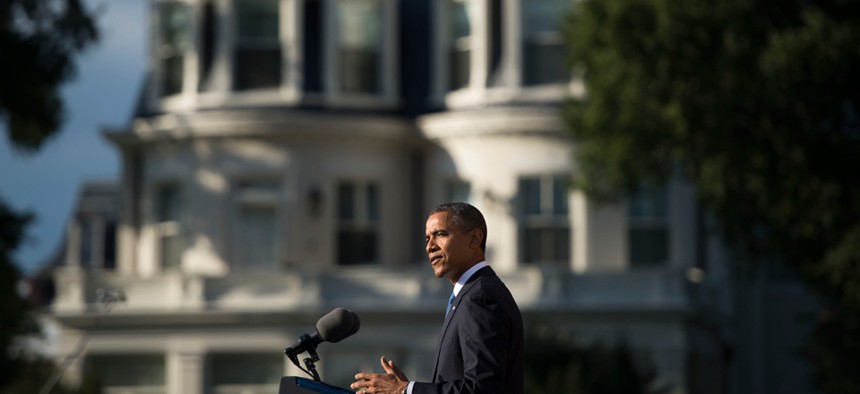
Defense Department file photo
Does Obama Have ‘Zero Control’ Over the Bureaucracy?
The administration’s arms-length view of government has extended well into the president’s second term.
Last week, in Rolling Stone, Reid Cherlin, a former spokesman for President Obama, explored the reasons for the president’s uncomfortable, adversarial relationship with the media. In the process, he illuminated an ongoing issue for the administration: Even in Obama’s second term, it’s clear that he and his team are having a difficult time making the transition from campaigning to governing -- and in some ways they appear to have all but given up hope on effectively managing government.
Cherlin recalled the wisdom of a veteran staffer on the first campaign he worked on: “Just remember, your worst day on the campaign is better than your best day in the White House." That, said Cherlin, turned out to be not much of an exaggeration.
“The president is nominally in charge of so much that it often feels like the power dynamic inverts, and that the White House exists to take blame for the misdeeds of others -- very often agencies or bureaucrats over which you have essentially zero control,” Cherlin wrote.
“Zero control”? It’s true that the federal government is a massive, incredibly complex enterprise that extends into myriad aspects of Americans’ lives. But a president has much more than “zero control” over the agencies that he leads. It’s how he or she chooses to exercise that control that counts.
As I’ve written before, Obama has a tendency to characterize management failures -- from the Healthcare.gov rollout to political targeting at the IRS -- as things that are happening to him, not efforts for which he and his lieutenants ultimately bear responsibility. To a certain degree, that’s acceptable in a first term, as an administration adjusts to governing. But in a second term, Americans have a right to expect the basic machinery of government to function well.
The president obviously is not directly responsible for the day-to-day management of federal agencies. And he’s right to point out that it’s not really his fault that “at any given moment on any given day, somebody in the federal government is screwing up.”
But the president is responsible for setting up a structure in which appropriate decisions are made and carried out. Mostly, this is a matter of devoting time and attention to management. That means setting clear priorities, requiring those down the chain of command to establish apprpriate goals for reaching them, and evaluating their progress.
That is, much of the time, a thankless endeavor. And it almost never results in accolades -- even from one’s political supporters. Had Veterans Affairs medical centers met their goal of ensuring veterans saw doctors within 14 days of requesting appointments, there would have been no congressional hearings to congratulate them.
Nevertheless, declaring that the president has “zero control” over federal operations comes very close to a “buck stops there” philosophy that almost guarantees ineffective management.







